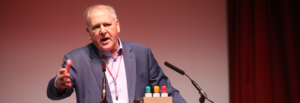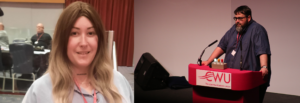T&FS Conference 2024 – Day Two
Telecoms & Financial Services April 25 2024
100% solidarity with Enniskillen members
Northern Ireland Telecoms Branch delegate Paddy Meehan brought Conference to its feet with a rousing call for solidarity and support for Enniskillen workers and their community.
In a powerful proposition-moving speech, Paddy said that some 300 EE (former BT) jobs in the Fermanagh town are under threat if the site closes and its operations are transferred to Belfast – over 80 miles away – and that the situation has sparked a local ‘Save Our Site’ campaign.
“Look at a map and see how far apart Enniskillen and Belfast are,” he said, adding that it was unreasonable and impractical for workers to make that journey twice every day. As well as the impact on workers, the local community – an area with an already high unemployment rate – also stands to be hit hard by a closure.
Hundreds of people have attended rallies in the town, with the support of politicians right across the usual divides, Paddy continued, adding that members were grateful for their support and also for the efforts made by CWU national officer Steve Albon and DGS-elect Karen Rose on behalf of impacted members.
Northern Ireland Telecoms’s motion sought to instruct the T&FS executive to continue the ‘Save Our Site’ campaign, carry on lobbying local politicians and fight against closure of the site.
In conclusion, Paddy appealed to delegates from other branches to come up and express their support and to the company leadership, he said: “You need to step back and think again.” In the ensuing debate, speaker after speaker came to the rostrum pledging the support and solidarity of their own branches – with some talking of similar situations begin faced by their own members – and, when the vote was called, it was unanimously in favour of the motion.

Line in the sand – fighting compulsory redundancies
Delegates set a robust policy of opposition to any compulsory redundancies across BT Group “using all means up to and including industrial action,” describing the position as a “line in the sand” that the union will not allow the company to cross.
Moving a detailed motion on behalf of South London, Surrey & North Hampshire (SLSNH) Branch, Phil Allen referenced job losses among Openreach frames engineers and said that the company should work with the CWU to identify alternative jobs, bring outsourced work back in-house and maximise redeployment opportunities. He criticised the way that the business is dealing with the situation at present and insisted: “We need to tell the company: ‘Change course now’,” adding that industrial action should be considered by the union if there is no co-operation on these action points or if there is a compulsory redundancy.
Supporting the motion, Midland No1 Branch delegate Ali Moosa highlighted the paragraph within it calling for close monitoring of the extent of third-party contractor work being done across the network and cited several areas where contractors are doing work that our members could do, while Nigel Bailey, from South East Anglia Branch also backed the motion and urged Conference to “please support and don’t forget, a fundamental reason for a trade union is to fight for people’s jobs.”
Speaking on behalf of the executive, DGS Andy Kerr asked delegates to oppose this particular motion. Not because of its robust stance against compulsory redundancies, but because of some of its wording and detail, he explained. The vote on this proposition was close, but it was lost and Conference moved on to the next two motions.
The first of these, from South Wales Branch, was a concise, two-sentence instruction to the T&FSE to “make preparations to oppose compulsory redundancies in Openreach using all means up to and including industrial action,” while the second (Edinburgh, Dundee & Borders) was a more detailed motion on measures the union is urging on the company to avoid compulsory redundancies.
Both of these motions were supported by the executive and approved by Conference, with many comments during the debate pointing to the current and ongoing need for experienced frames engineers to assist in the bulk migration stage of heavy cable recovery (HCR). It makes absolutely no sense, several contributors said, to be making these workers compulsorily redundant in these circumstances.
Among the speakers were frames members personally impacted by the situation, one of them becoming emotional when she spoke of her sadness at leaving the company and that she felt she had been given no choice, while another said: “We need to get back to the grassroots here and fight for the members who are left.” Eugene Caparros, from South Wales, slammed the collective consultation process for these workers as “a sham and a rush to put members out the door,” adding: “Our response to any future repeat must be strong.”
Summing up these debates, Andy Kerr said: “The Openreach National Team have argued like hell over the handling of the frames issue. They’ve put alternatives, there are alternatives, but if the company don’t pay attention to us, and if that’s the way they’re going to handle when we put genuine alternatives, we’ll have no option but to ballot for action.
“Let’s pass this motion and send a message, enough is enough and we’re not having it anymore.
“There’s a lot of work for us to do together.”

Delegates speak out against ‘BT Speak Up’
An anonymous complaints system set up by BT Group came in for strong criticism amid multiple concerns that it may be being abused by those with personal grudges making vexatious and false allegations, Conference heard. Motions from Midland No1 and Lincolnshire & South Yorks highlighted the problems caused by the company’s ‘BT Speak Up’ process and called for a formal review of the whole system and for a minimum standard of information before a complaint is acted upon.
During the debate, Portsmouth, West Sussex & Isle of Wight delegate Amber Binns said that she had suffered an injury restricting her ability to perform her job, but had then been anonymously accused, via ‘BT Speak Up’, of faking her own injuries. “This made me lose all trust in my peers. I didn’t know who I could trust anymore,” she said, adding that here needed to be appropriate safeguards introduced, while Jonathan Bellshaw, of Lincolnshire & South Yorks said: “The process is open to abuse and our branch has several examples of this. We’ve had three branch officials subject to various ‘Speak Ups’.”
Midland No1 delegate Tracey Aldridge said: “Malicious reports are being made and there is no comeback. Investigations are causing innocent members stress and concern” and Ali Moosa, from the same branch, reminded Conference that systems such as these were put in place as a consequence of a new law enabling so-called ‘whistleblowers’ to report corporate crimes and was being misused here. “The law on whistleblowing was not brought in to grass up workmates,” he said.
Conference approved the second of these two motions, calling for a minimum standard of information before a fact-finding can take place. Delegates also debated motions on a range of other workplace issues across the T&FS sector, covering issues including sick pay, attendance policy, holding formal meeting online or in person, hybrid working, London Weighting, mental health at work, carers’ passports and the Openreach flex system.

